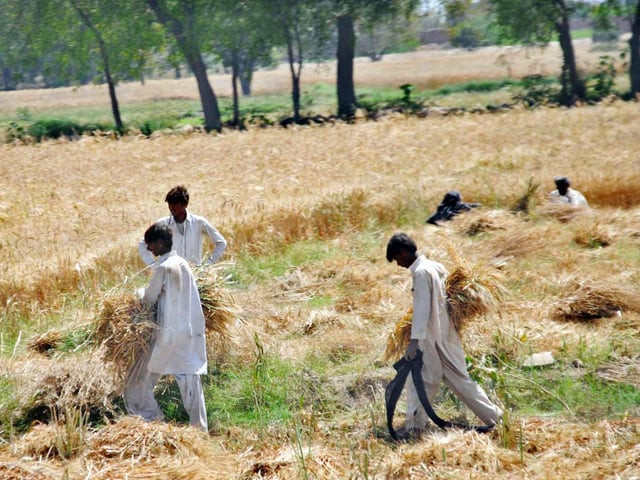Banks hesitant to fund wheat buying
ECC members say provinces should seek loans on their own without govt guarantee

As provinces remain trapped in a huge commodity debt pile, banks are reluctant to provide loans to provincial governments for wheat procurement without securing federal government guarantee.
The issue was taken up in a recent meeting of the Economic Coordination Committee (ECC) while discussing a proposal to hand over wheat procurement tasks to provinces. Economic managers discussed the wheat buying drive thoroughly, where different views were expressed.
Some members raised questions about the provincial jurisdiction over agricultural crops, suggesting that provincial governments should set wheat purchase targets as per their needs.
Some ECC members proposed that provinces should obtain loans from commercial banks for the purchase of wheat on their own without involving the federal government. However, it was clarified that banks were reluctant to extend loans to the provincial governments without the federal government guarantee.
Additionally, it was pointed out that the current procurement process had resulted in piling up of huge debts for provinces. The system also favoured middlemen, instead of farmers, therefore it needed a major overhaul.
ECC members emphasised that wheat procurement was aimed at stabilising prices along with maintaining its proper supply throughout the year.
It was explained that wheat stocks carried by Pakistan Agricultural Storage and Supplies Corporation (Passco) had other purposes as well such as supply to wheat-deficit provinces and armed forces, which could not possibly be done by the private sector without proper planning.
It was stressed that Punjab had significantly reduced its circular commodity debt in consultation with the Finance Division.
A Punjab representative revealed that in the current year the province would keep a flexible procurement target to stabilise prices instead of launching a rigid target-based campaign. The ECC appreciated and supported the province’s approach.
Sindh, on its part, supported the continuation of the current procurement process, as proposed by the Ministry of National Food Security and Research.
The ECC agreed that the proposal made by the food security ministry may be approved but with the commitment that the entire procurement drive needed to be thoroughly examined for possible reforms to prepare a forward-looking plan. Under the plan, the government would gradually shift the task of procurement to the private sector, except for keeping strategic reserves.
It was suggested that the ministry should present a comprehensive plan to the ECC. Additionally, Passco’s storage capacity should be upgraded as per international standards and potential models should be studied, including seeking equity from international agencies to build state-of-the-art silos.
It was proposed that any future procurement plan and wheat supply should also envisage permission for wheat import.
The Ministry of National Food Security submitted proposals for the ECC’s consideration and approval.
It proposed that Passco may be assigned a procurement target of 1.40 million metric tons with a tentative cash credit limit of Rs169 billion at a price of Rs3,900 per 40 kg of wheat.
In addition, the government of Sindh may be assigned a wheat buying target of one million metric tons with tentative cash credit limit of Rs100 billion at a price of Rs4,000 per 40 kg.
The government of Balochistan may be assigned a target of 0.050 million tons with cash credit limit of Rs5.7 billion at a price of Rs4,300 per 40 kg.
The ministry said that incidental charges may be borne by the respective provincial governments. In case of any emergency, the ministry may be allowed to re-approach the ECC for a revision in Passco’s procurement target.
The ECC considered a summary submitted by the Ministry of National Food Security titled “Fixation of wheat procurement targets 2024 for Passco, Sindh and Balochistan along with cash credit limits” and approved the proposal.
It directed the ministry to regularly monitor wheat stocks and the procurement exercise with a view to keeping the ECC updated.
Directives were also given for a thorough review of the procurement need emanating from the domestic requirement and presenting all aspects to the committee together with the way forward focused on involvement of the private sector to reduce the government’s footprint in wheat procurement beyond necessary strategic reserves.
The ECC directed the Finance Division to continue to monitor the implementation of commodity debt retirement plans of Punjab and Sindh and adjust cash credit limits to the extent of their unsecured exposure as of September 2023.
Published in The Express Tribune, April 16th, 2024.
Like Business on Facebook, follow @TribuneBiz on Twitter to stay informed and join in the conversation.



















COMMENTS
Comments are moderated and generally will be posted if they are on-topic and not abusive.
For more information, please see our Comments FAQ